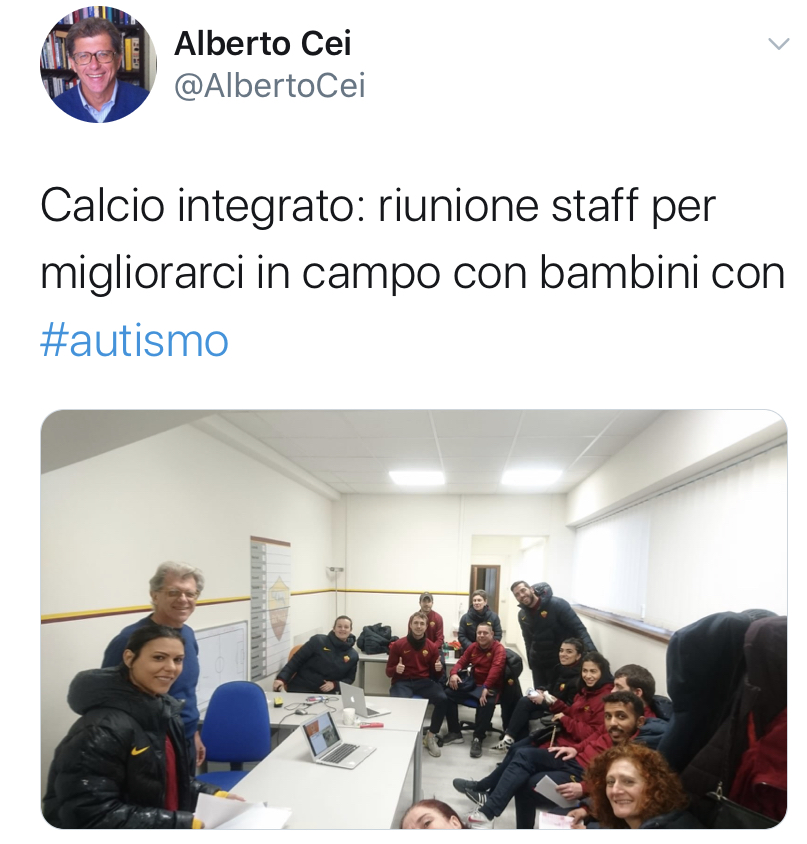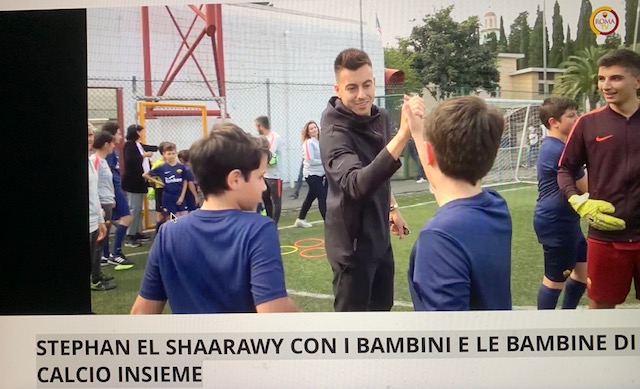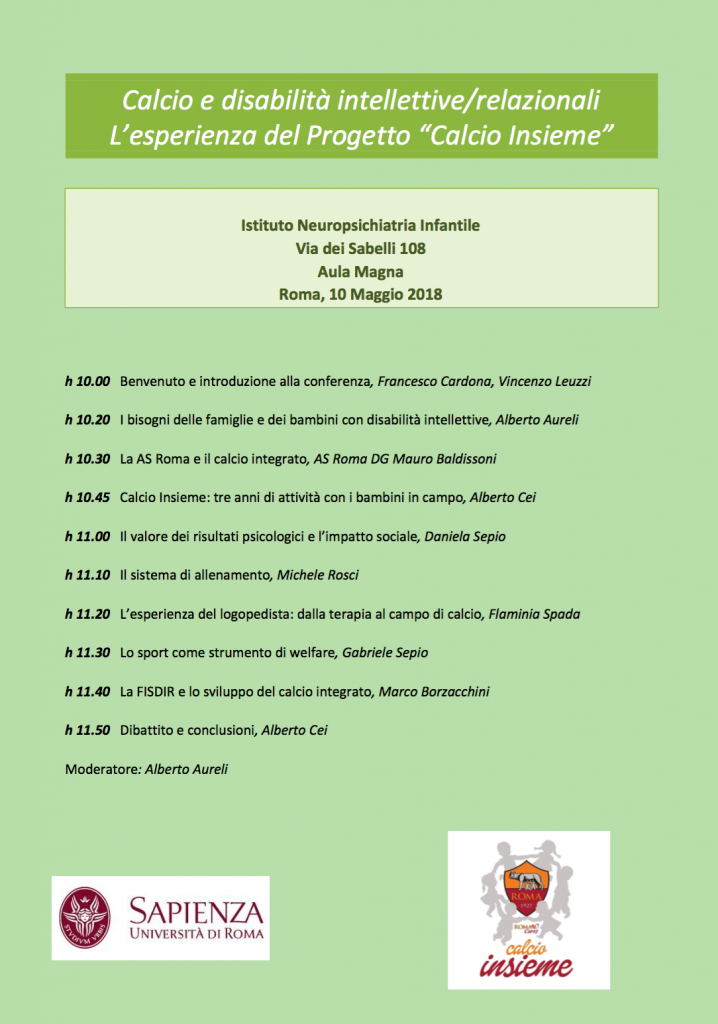The 7th year of the “Calcio Insieme” project for young people with intellectual disorders and with particular attention to autism spectrum disorder is about to begin. This soccer activity involves 80 young people from 6 to 18 years old, enrolled within a specific training program that follows an innovative educational model. The activity is carried out by Roma Cares Foundation and Accademia di Calcio Integrato. Watch the video: da7186cb-7301-4c3b-913a-dcc9e91fd6eb
Tag Archive for 'AS Roma'
“Summer Together” camp has begun, promoted by Roma Cares in collaboration with Accademia Calcio Integrato with youth ages 6-18 with intellectual disabilities playing soccer. Second day, the boys and girls arrive at the camp and start playing in the big pitch. Peaceful environment, they shoot on goal. This happens while waiting for the other teammates to arrive. Then we listen and sing the Italian anthem all together.
Training begins with coordination exercises with the ball, divided into two groups of 5. There are 3 AS Roma coaches following them, providing technical instructions and encouraging them to keep up the pace of the exercise.
Different sized shots on goal on stations, rotating every few minutes.
These are young people who have been training with us for a long time, some for 6 years others for 4. The summer camp is 5 hours on 5 days per week (the global group in three weeks will be of 90 young). The group of 10 I’m talking about is made up of young people with intellectual disabilities with good motor functioning even though some have difficulty running, some would mostly walk and run a few steps, and some are very fast. Some need more than others to alternate minutes of activity with a break (in any case it is very hot here in Rome).
For the latter, having many hours available to train is important, since in this way they have the opportunity to train for an overall long period of time, while during the weekly training sessions, stopping for 20 minutes means losing almost 40% of the training time, which is 50 minutes.
Of course there are also moments of tension, some boys show restlessness, someone else argues with a teammate, someone responds impulsively or takes offense because they do not pass the ball, others get tired and are prone to isolation.
These difficulties can be resolved with the patience of the coaches who understand these problems, but above all thanks to the fact that the game continues and these episodes do not disturb those who play. In this sense the continuity of the activity is a stimulus to those who leave to return to play. This is because, in any case, the objective is to maintain a positive and pleasant atmosphere that, in the end, outweighs any difficulties encountered.
With an image we can say that the river flows, when a boy/girl lives a more critical moment, its flowing helps to solve individual problems because the collective continues the activity, so everything flows and then you get to the sea where everything ends.
Coaches carry out their leadership role with understanding and closeness but in a firm manner. This attitude of theirs is the essential cornerstone for which everything flows, despite the fact that we are coaching young people with intellectual disabilities.
A lot of work is done to bring value to coaching. This is the reason why listening to and singing together the Italian anthem and before the final match the Champions League anthem are moments that precede significant moments of the training. It’s obvious, finally, that wearing the AS Roma uniform is another unifying factor, a way for these young athletes to feel proud and part of something that in their perception is immense.
In the next few days I will tell you about the experience of other young people who participate at “Estate Insieme”.
- Il calcio è lo sport più amato dai giovani di tutto il mondo: si può giocare ovunque, al chiuso e all’aperto, ogni luogo si può trasformare in un campo di calcio e chiunque indipendentemente dalle sue capacità può giocare una partita.
- Il pallone è un strumento sportivo senza rivali: lo puoi calciare con i piedi o con le mani e colpire con ogni parte del corpo; tutti possono passare la palla, tirare in porta o provare a parare un tiro. Dai un pallone a un gruppo di bambini e non si stancheranno di rincorrerlo.
- Il calcio favorisce l’inclusione di tutti, ogni ragazzo o ragazza può correre dietro una palla, toglierla a un altro, tirare, passare e parare.
- I giovani con disabilità intellettiva sono di solito esclusi dal gioco del calcio, perché sono rare le opportunità che gli vengono offerte.
- Giocare a calcio e con il pallone gli permette di stare con i compagni di classe, con i loro amici e di conoscerne di nuovi.
- Calcio è stare all’aria aperta, vedere le stagioni anche se si vive in città e imparare a muoversi con gli altri quando fa freddo o caldo o quando tira vento.
- Calcio è partecipare a un allenamento centrato su apprendimenti nuovi che determinano il miglioramento delle abilità motorie di base, coordinazione, abilità tecnico- tattiche, abilità di comunicazione, collaborazione e cognitivo-affettive.
- Calcio è stare in gruppo insieme durante l’allenamento, condividere gli stessi spazi, esercitandosi da soli ma anche con un altro compagno o in piccoli gruppi.
- Calcio è vestire la divisa della propria squadra, la Roma, andare allo stadio insieme a tutto il gruppo a vedere le partite e andare a scuola con questa uniforme, essere riconosciuti dai compagni come allievi della scuola calcio della Roma.
- Calcio è integrazione, allenandosi e partecipando a tornei e giocando partite di calcio integrato 5vs5 composte da tre giovani con disabilità intellettiva e due giovani della AS Roma.
Calcio Insieme è un progetto di empowerment psicologico, relazionale e motorio tramite il calcio per giovani con disabilità intellettiva, con particolare riferimento al disturbo dello spettro autistico.
Dal 2015 la Fondazione Roma Cares, espressione della responsabilità sociale dell’AS Roma Calcio, e Asd Accademia Calcio Integrato orga- nizzano su base annuale programmi di sviluppo motorio attraverso il gioco del calcio per bambini con disabilità intellettive. Le indagini condotte hanno evidenziato la costante presenza dei bambini durante le attività e la soddisfazione delle loro famiglie e i benefici motori, sportivi e psicosociali che derivano da questi programmi.
Scopo di questo Seminario è di presentare i risultati delle ricerche condotte, illustrare il modello d’intervento, realizzato per la prima volta nel calcio giovanile con la collaborazione degli istruttori della AS Roma, degli psicologi dello sport, del logopedista, dei medici e dei responsabili dei rapporti con le scuole e le famiglie.

Calcio Insieme is a project of psychological, relational and motor empowerment through soccer for young people with intellectual disabilities, with particular reference to autism spectrum disorder.
Since 2015, the Fondazione Roma Cares, an expression of the social responsibility of AS Roma Calcio, and Asd Accademia Calcio Integrato have been organizing annual motor development programs through soccer for children with intellectual disabilities. The surveys conducted have highlighted the constant presence of children during the activities and the satisfaction of their families and the motor, sports and psychosocial benefits derived from these programs.
The aim of this Seminar is to present the results of the research conducted, illustrate the model of intervention, realized for the first time in youth soccer with the collaboration of AS Roma coaches, sports psychologists, speech therapists, doctors and manager for relations with schools and families.
I started again last Saturday the activity of what I consider the new sports season. I started with tennis, volleyball, handball, the revision of an article on teaching soccer to children with autism and the reading of a dozen thesis projects being carried out. It hasn’t been a soft start but it’s giving me a sense of work normality, at a time that obviously is not the case. Like everyone else I live with this perception of uncertainty and not knowing what will happen in the coming months.
My work is quite planned and without this pandemic it would be varied and interesting. In the meantime it is done “as if” it should proceed as planned, with the awareness that I have to prepare for the necessary adaptations and changes depending on how the health situation will evolve. I am thinking, for example, at “Calcio Insieme” project with our 80 young people with autism playing soccer. With AS Roma and the Integrated Football Academy we are organizing ourselves in order to be able to carry out the training activity in conformity with the rules and in safety for everyone.
My main work is with teenage athletes who aspire to excellence but don’t know if they will reach these levels and with top athletes who are preparing to establish themselves internationally. To a large extent, they are aware of the importance of the mental component of their activity, knowing that they must also engage in psychological work, which is certainly not easy to do. In a time of crisis as it is today, psychological support becomes even more essential to learn to accept fears, anxiety about the future and the limitations required to ensure your own health and that of the people you work with on a daily basis.
I experienced their fears during the lockdown, when left alone at home, many risked living in angst and passively suffering that period. Psychological support with them was, in my opinion, indispensable to allow them to take their lives into their own hands even in those negative moments. Now the limitations have been greatly reduced, but the fears remain until we will have the vaccine. The psychologist remains the only person with whom to share these concerns and to improve resilience and confidence.
Our main sports organizations, compared to those of other European countries, have not clearly dealt with these issues and the same is true for the organizations of sports psychologists. No shared and specific documents have been produced and, therefore, the responsibility has been left to the individual initiatives of professionals.
What can I say, I hope to realize together with all the people I work with the projects we have planned. What is certain is that we never give up, we have been and will always be ready to solve the problems that will arise. My motto is: “something done well, you can do better” (Gianni Agnelli).
Good luck to all the optimists!!!
Yesterday simple twitter had 2353 views. It’s a photo of a meeting of our staff discussing the new training program for children with intellectual disabilities and largely autistic, to improve their motor learning and teach football.
The interest it has aroused shows how the theme of sports practice for these children (6-13 years) is topical, there are few who are regularly involved in sport, we do not really know how many of them, how often and what activities they do. Research data shows these children practice individual sports, mainly running and swimming. Programs involving them in football schools are extremely rare, as they require competent coaches and psychologists. Often football is not recommended for these children because they are placed in groups with young people with typical development and coaches who do not have time and skills to teach them.
Roma Cares, AS Roma and the Integrated Football Academy have been designing and implementing the “Calcio Insieme” project for 5 years, which currently involves 70 children with intellectual disabilities. It involves a staff of 10 coaches, 5 sports psychologists, 1 speech therapist, 1 doctor, 1 manager of relations with families and schools, 1 technical manager and 1 scientific manager. It is a complex project that involves children from October to June twice a week. The results obtained and published in scientific journals have shown significant improvements in the motor and psychosocial areas.
Calcio insieme
Un programma di calcio integrato per giovani
con disabilità motorie e intellettive
ALBERTO CEI, MICHELE ROSCI, DANIELA SEPIO
Università San Raffaele AS Roma Accademia di Calcio Integrato
Convegno Nazionale Scientifico AIDEE 2019
La Disprassia
Roma, 17-18 Novembre 2019
Calcio Insieme, è un progetto promosso dalla Fondazione Roma Cares, Onlus legata al più ampio contesto di responsabilità e sostenibilità sociale della AS Roma e dalla Asd Accademia Calcio Integrato, il cui obiettivo è lo sviluppo di una cultura dell’integrazione e dell’educazione ai valori dello sport attraverso il calcio.
Obiettivi - Studiare gli effetti di un programma di allenamento basato sull’insegnamento del calcio, su giovani con disprassia e con disturbo dello spettro autistico (ASD) promuovendone le competenze psicosociali, motorie e calcistiche. Nessun altro studio è stato condotto su sport di squadra e a nostra conoscenza i dati a disposizione provengono da sport individuali (Bremer et al., 2016; Luiselli e Cei 2017; Rivilis et al., 2011)) se non sono addirittura sconsigliati (https://dyspraxiafoundation.org.uk/dyspraxia-children/pe-lessons/).
Metodo - 30 partecipanti sono stati sottoposti a valutazione motoria pre/post. Valutazione psicosociale effettuata con interviste pre/post a genitori e insegnanti e con una valutazione svolta sul campo e continuativa nel tempo da istruttori di calcio e psicologi dello sport.
Risultati – Abilità motorie: differenze significative rispetto alle valutazioni iniziali in 6 prove su 10. Abilità calcio “correre con la palla”: il 39,3% non mostra alcun miglioramento, il 28,6% raggiunge un livello intermedio e il 10,7% un livello medio alto di abilità. Interviste ai genitori e insegnanti: percepiscono un incremento delle abilità psicosociali e motorie. Tale incremento differisce in base alla gravità del disturbo del giovane.
Conclusioni - Si conferma quanto emerso dalle rassegne su persone con ASD per cui la dimensione motoria migliora con percorsi specifici di apprendimento sportivo, ma a ciò si aggiunge che l’organizzazione dell’allenamento in attività di gruppo e individuali favorisce lo sviluppo delle competenze psicosociali. Il ridotto numero di giovani con disprassia richiede che i risultati dovranno essere documentati su una popolazione più ampia. Gli sviluppi futuri del progetto andranno verso una distinzione dei programmi di ricerca e di allenamento, con modelli specifici di intervento per le diverse diagnosi coinvolte.
Per sapere di più su Calcio Insieme:
Cei, A., Franceschi, P., Rosci, M., Sepio, D., e Ruscello, B. (2017). Motor and psychosocial development in children with autism spectrum disorder through soccer. International Journal of Sport Psychology, 48, 485-507.
Cei, A. e Luiselli, J. (a cura di) (2017). Sports, exercise and physical health among people with intellectual and developmental disabilities. International Journal of Sport Psychology, 48, 473-568, Special Issue.
Cei, A., Ruscello, B., e Sepio, D. (2019). Summer camp for children with ASD and parents perception of changes in psycho-social skills. International Journal of Sport Psychology, 50, 162.175.
Cei, A., Sepio, D., e Rosci, M. (in press). Sport, calcio e integrazione: L’esperienza dell’AS Roma con i bambini con disabilità intellettiva. Torgiano: Calzetti e Mariucci.
If you want to know more: send me mail for articles pdf.
Ulteriori informazioni: www.accademiacalciointegrato.com







